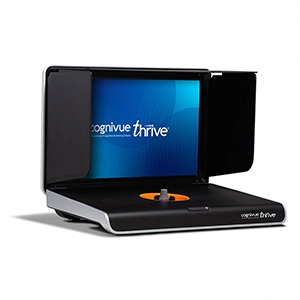Our Cognitive Care
Why Cognitive Care?
Your cognitive health refers to a collective set of abilities—such as thinking, learning, speaking, and clearly recalling information.
Hearing loss doesn't just affect your ears; it affects the quantity and quality of neurological input to the brain. This deprivation causes changes in brain neurology, function, and structure. It increases the mental effort needed to process information (especially in noise), depleting cognitive resources necessary for memory and attention.
Additionally, hearing loss can impact social interaction and emotional well-being, increasing the risk of isolation, depression, and anxiety. Taking care of your cognitive health needs to begin way before you or your family sees a decline.
The Research: Lancet Commission
The Lancet Commission—a series of science-led, international collaborations regarding Dementia for both 2020 and 2024—outlined hearing loss to be the primary modifiable risk factor related to developing dementia.
Because of this causal association, our providers view patients with the future in mind. Modern medicine helps add years to lives, but Western Colorado Hearing Clinic aims to add quality of life to those years.
About Cognivue: Our Cognitive Screener

At Western Colorado Hearing Clinic, we utilize the FDA approved cognitive screener – Cognivue. What makes Cognivue different is the ability to hear is not required for the process. The technology includes captions for those who are hard of hearing or have severe hearing loss.
It is a short cognitive screening test that evaluates aspects of your cognitive functioning. The test focuses on five cognitive domains: memory, visual spatial ability, executive function, reaction time, and processing speed.
By completing a Cognivue screening, the patient is able to determine where their abilities lie in reference to other normative data and can aid in helping them develop a plan of action for improvement or maintenance. This information is also widely appreciated by physicians and other healthcare professionals as it delivers clear and meaningful information to both patients and medical providers alike.
Our Treatment Options for Cognitive Decline
Hearing Aids
Hearing Aids can play a significant role in potentially slowing or preventing cognitive decline associated with untreated hearing loss. In fact, studies have shown that using hearing aids can reduce the risk of decline by up to 600%. Hearing aids help mitigate the negative impacts of hearing loss on the brain by providing proper neural stimulation to the brain and reducing cognitive load. This also provides opportunity for enhanced social engagement, delays the progression of further hearing loss, and potentially removes the associated risk of dementia caused by untreated hearing loss.
Cochlear Implants
Cochlear implants, while primarily known for restoring hearing, can also play a role in mitigating cognitive decline. Similar to hearing aids, cochlear implants can improve speech perception and help to provide proper neurological stimulation to the brain from sound. Studies have shown that cochlear implantation can improve cognitive functions like executive function, verbal memory, and non-verbal memory.
Auditory Cognitive Rehabilitation
Cognitive rehabilitation includes techniques like memory training or computer- or phone-based exercises, which can help individuals develop strategies to cope with cognitive changes and provide improvements in skill or coping strategies. We also use therapies targeted toward the social element o help patients remain engaged and challenge them to work towards higher-level function where appropriate.
Cognitive Behavioral Therapy
Cognitive Behavioral Therapy (CBT) can be a beneficial intervention for individuals experiencing cognitive decline, particularly when associated with conditions like depression or anxiety, or even as a preventative measure. While not a cure for dementia, CBT can help manage symptoms, improve quality of life, and potentially delay progression by addressing negative thought patterns and behaviors. CBT is also helpful for loved ones in aiding their understanding of the condition and provide a more compassionate and supporting foundation for relationships.
Nutrition Counseling
Nutrition counseling can play a significant role in preventing, managing, and potentially slowing cognitive decline. Focusing on specific dietary patterns can improve cognitive health. Our nutrition counselor will work with you one-on-one to determine how your diet should be adjusted to positively impact your cognitive health.
The Connection Between Hearing & Brain Health
A Proactive Approach to Brain Health
At Western Colorado Hearing Clinic, we view hearing care as a critical component of your overall health strategy. Because the link between untreated hearing loss and cognitive strain is well-documented, our approach goes beyond simple amplification. We provide comprehensive cognitive hearing care for our Colorado patients, focusing on early detection, neuro-focused technology, and long-term brain resilience.
Reducing the Cognitive Load
When hearing becomes difficult, the brain is forced to divert resources from memory and comprehension just to process sound—a phenomenon known as "cognitive load." This can lead to fatigue and social withdrawal. Our goal is to reverse this dynamic. By addressing hearing and cognitive decline early, we help reduce that mental strain, allowing you to stay sharp, engaged, and confident in your daily interactions.
Personalized Treatment Plans
There is no one-size-fits-all solution for brain health. Your provider will design a treatment plan based on your unique Cognivue scores and lifestyle needs. Whether through advanced hearing aids optimized for brain health, auditory rehabilitation, or nutritional counseling, our solutions are designed to keep you connected to the people and places you love.
Trusted Audiology Care & Your Next Step
As a locally owned practice, we are proud to bring world-class audiology services to Grand Junction, Montrose, Gunnison, and Glenwood Springs. You do not have to navigate these changes alone. If you are noticing shifts in your hearing or mental clarity, contact us today to get started on your hearing health journey.
Frequently Asked Questions
How does hearing loss affect cognitive health?
Hearing loss forces the brain to reallocate resources from memory and thinking to auditory processing—a concept known as “cognitive load.” Over time, this deprivation can contribute to structural changes in the brain and accelerate cognitive decline.
Can hearing aids support brain health?
Yes. By restoring auditory input, hearing aids provide the brain with the stimulation it needs to remain active. Reducing the “listening effort” allows the brain to focus on executive functions like memory and comprehension, rather than just identifying sound.
When should someone consider cognitive hearing care?
We recommend an evaluation if you experience “listening fatigue,” trouble following conversations in noise, or memory lapses. However, because cognitive changes can be subtle, we suggest a baseline screening for anyone over 50 or anyone with known hearing loss.
Is cognitive hearing care only for older adults?
No. While cognitive decline is often associated with aging, auditory processing issues can affect adults of any age. Early intervention is key; protecting your neural pathways now is the best strategy for long-term brain resilience.
What should I expect during a cognitive hearing evaluation?
Unlike a standard hearing test, our evaluation uses FDA-cleared Cognivue technology. We assess five key cognitive domains—including memory, visuospatial ability, and reaction time—to see how your brain is processing the sound it hears.

